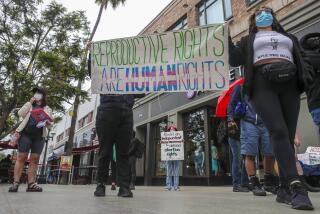Lawsuit Trains Spotlight on ‘Bundling’ : Politics: Donating contributions by individual workers allows corporate executives to skirt funding limits.
- Share via
WASHINGTON — William P. Neiss contends he was fired on March 3 from his job at Cherry Payment Systems Inc. in Madison, Wis., because he refused to contribute at least $1,500 to attend the “President’s Dinner” that will be held next week in Washington to raise money for Republican congressional candidates.
Neiss’ complaint against his former employer, which is detailed in a lawsuit he filed recently in Dane County Circuit Court in Madison, is gaining national attention as an example of the problems created by the current system of political fund raising known as “bundling.”
Bundling allows business executives to skirt federal election law, which prohibits direct corporate contributions to candidates and strictly limits contributions from corporate political action committees, known as PACs. By bundling many checks collected from individual employees, corporations can, in effect, contribute unlimited sums of money to candidates and the parties.
William Haus, Neiss’ lawyer, contends that both Republican and Democratic officials are encouraging American corporations to coerce employees such as Neiss into contributing to candidates favored by top executives.
The lawsuit came to light at a time when President Bush is promising to veto a bill that would severely restrict bundling. The House has passed the bill; the Senate is expected to do so.
Neiss, a 24-year-old registered Republican, alleges that he was the victim of a scheme devised by James R. Elliott, chairman of the board of Cherry Payment Systems in Chicago, to “coerce, intimidate and extort employees.”
Elliott, who was imprisoned in the mid-1980s on federal bank fraud charges, is one of many corporate executives who are serving as honorary co-chairmen of the President’s Dinner, an annual event hosted jointly by the National Republican Congressional Committee and the National Republican Senatorial Committee. Party officials say the dinner is expected to raise more than $7 million.
The Washington Post reported today that Elliott said through a spokesman that he is “cooperating fully” with a yearlong Federal Deposit Insurance Corp. investigation of his relationship with First Interstate Bank of South Dakota.
His spokesman, Jim McAvoy, said Elliott’s fund-raising activities for the dinner and for President Bush’s reelection campaign had nothing to do with the investigation.
Elliott’s lawyer is former Illinois Gov. James R. Thompson, who did not respond to telephone calls from The Times. He told the Post that Neiss, a salesman, was a disgruntled employee who did not measure up and that the firing was coincidental.
On Feb. 13, the suit alleges, Elliott wrote a memo urging employees to contribute to the President’s Dinner “at the highest level at which you may commit.”
On Feb. 17, employees received a follow-up from Peter Moles, regional marketing director. According to a copy of the memo filed with Neiss’ legal brief, Moles wrote: “If you are asking yourself, can I afford to make this trip; then ask yourself if you can afford not too (sic). We will truely (sic) see what kind of cloth your (sic) cut from when I hear from those of you that plan to participate.”
Thereafter, Neiss alleges, he received at least five telephone calls from executives asking him to give at least $1,500 and to raise enough additional money to purchase an entire table for $20,000. Neiss says he informed Moles on March 2 that he did not intend to give any money. The next day, he was fired.
More to Read
Get the L.A. Times Politics newsletter
Deeply reported insights into legislation, politics and policy from Sacramento, Washington and beyond. In your inbox twice per week.
You may occasionally receive promotional content from the Los Angeles Times.










